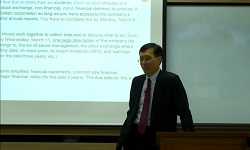본 연구는 EU'Fit for 55' 정책에 따른 해운 부문 탄소배출권거래제(ETS)가 한국해운기업의 경제적 부담과 재무구조에 미치는 영향을 분석한다. 클락슨 WFR 데이터베이스를 활용하여 우리나라 원...
http://chineseinput.net/에서 pinyin(병음)방식으로 중국어를 변환할 수 있습니다.
변환된 중국어를 복사하여 사용하시면 됩니다.
- 中文 을 입력하시려면 zhongwen을 입력하시고 space를누르시면됩니다.
- 北京 을 입력하시려면 beijing을 입력하시고 space를 누르시면 됩니다.

ETS 도입이 국적 원양선사에 미치는영향 = Analysis of Allocative Efficiency and Characteristics of Production Function: The Case of Korean Shipping Companies
한글로보기https://www.riss.kr/link?id=A109454996
- 저자
- 발행기관
- 학술지명
- 권호사항
-
발행연도
2024
-
작성언어
Korean
-
주제어
Shipping companies ; cost burden ; financial structure ; carbon emissions ; EU-ETS ; 해운기업 ; 비용부담액 ; 재무구조 ; 탄소배출량 ; EU-ETS
-
등재정보
KCI등재
-
자료형태
학술저널
-
수록면
575-591(17쪽)
- DOI식별코드
- 제공처
-
0
상세조회 -
0
다운로드
부가정보
국문 초록 (Abstract)
본 연구는 EU'Fit for 55' 정책에 따른 해운 부문 탄소배출권거래제(ETS)가 한국해운기업의 경제적 부담과 재무구조에 미치는 영향을 분석한다. 클락슨 WFR 데이터베이스를 활용하여 우리나라 원양선사인 HMM의 선박 통계를 추출하고, 실제 운영데이터를바탕으로연료사용량과탄소배출량을추정하였다. 분석결과, HMM의 유럽 항로 운항 선박은 연간 823.2kt의 연료를 소모하고, 256만 톤의 탄소를 배출하는 것으로 나타났다. ETS 비용은 탄소배출권 가격 시나리오에 따라 연평균 186.2억 원에서 967.7억 원까지 변동할 것으로 추정되었다. ETS 도입으로 영업이익률은 최대 6.2%, 총자본이익률은 최대 0.6% 감소할 것으로 예측되었다. 이는 한국 해운기업에 상당한 경제적 부담을 초래하고, 수익성과 재무건전성에 부정적인 영향을 미칠 가능성이 높다. 따라서 해운기업은 탄소배출 감축을 위한 전략적 대응 방안을 마련하고, 정부는 해운산업의 지속 가능한 발전을 위해 정책적 지원과 규제 대응책을 마련할 필요가 있다.
다국어 초록 (Multilingual Abstract)
This study analyzes the economic burden and financial impact of the Emissions Trading System (ETS) on Korean shipping companies under the EU's 'Fit for 55' policy. Using the Clarkson WFR database, statistics on ships owned by Korean shipping companies...
This study analyzes the economic burden and financial impact of the Emissions Trading System (ETS) on Korean shipping companies under the EU's 'Fit for 55' policy. Using the Clarkson WFR database, statistics on ships owned by Korean shipping companies were extracted, and fuel consumption and carbon emissions were estimated based on operational data. The analysis revealed that HMM's ships on European routes consume 823.2 kt of fuel annually and emit 2.56 million tons of carbon. The ETS cost burden is estimated to vary between 18.62 billion KRW and 96.77 billion KRW per year, depending on the carbon price. The ETS is predicted to decrease the operating profit margin by up to 6.2% and return on total capital by up to 0.6%. The EU-ETS could impose a substantial economic burden on Korean shipping companies, negatively affecting profitability and financial stability. Therefore, shipping companies need strategic responses to reduce carbon emissions, and the government should provide policy support and regulatory measures.
동일학술지(권/호) 다른 논문
-
랜덤 포레스트를 이용한 상하이발 해운 및 항공 운임 지수 간 영향 분석
- 한국해운물류학회
- 전준우
- 2024
- KCI등재
-
- 한국해운물류학회
- 박두진
- 2024
- KCI등재
-
- 한국해운물류학회
- 선현명
- 2024
- KCI등재
-
항만공사 ESG 경영의 사회적 가치에 관한 연구: 여수광양항만공사의 사례를 중심으로
- 한국해운물류학회
- 정찬민
- 2024
- KCI등재




 KCI
KCI KISS
KISS






